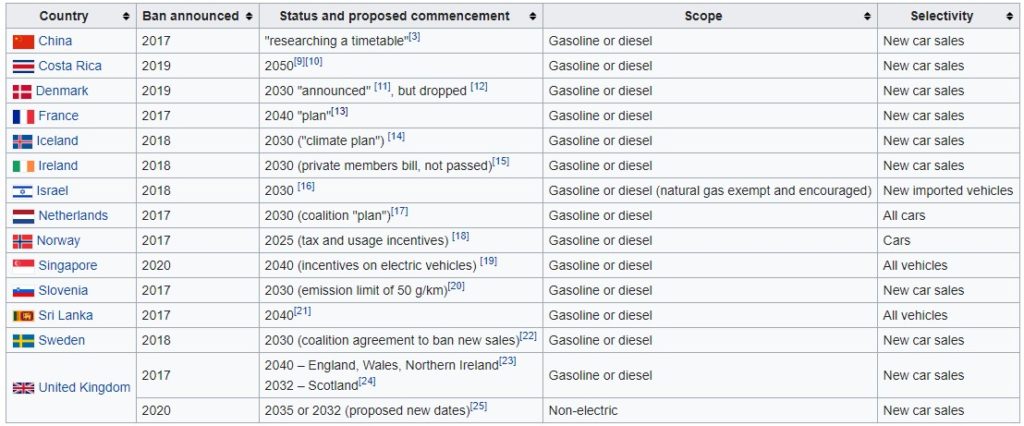Bills are being introduced around the world to prohibit the sale of cars with internal combustion engines. The movement was initiated by the European Commission, which pursues a policy to reduce CO2 emissions under the Paris Climate Agreement of 2015.
“With the entry into force of the Paris Agreement, the international community has committed itself to a modern low-carbon economy while the automotive industry is undergoing a profound transformation. The EU should seize this opportunity to become a world leader, along with the US and China, which are moving very fast,” the European Commission said.
The European Commission’s proposals do not contain any quotas for electric cars, but it wants to ensure that in 2030 30% of new cars are equipped with alternative motors, for the initiatives of the European Commission to be implemented, they must be supported by the European Parliament and the European Council, transmits Deutsche Welle.
We are all following the news and waiting for the outcome of the international conference known as COP26, which will be held in Glasgow in November 2020. This annual UN event assesses progress in the fight against climate change.
The Wikipedia website is constantly updating data on countries and cities that are taking action on a common vector to reduce CO2 emissions, as you can see, there are prohibitions on new cars being sold on IEDs, imported cars, and everyone else.
 https://en.wikipedia.org/wiki/Phase-out_of_fossil_fuel_vehicles.
https://en.wikipedia.org/wiki/Phase-out_of_fossil_fuel_vehicles.
2025
Norway
Norway plans to abandon cars with internal combustion engines in 2025. Last year, almost half of passenger car sales in this country were “clean” cars. At the same time, electric cars accounted for 31.2% by the end of 2019, while the rest were hybrids.
2030
PRC
China overtook the USA in 2009, becoming the largest car market in the world, which is still 21 million in 2019 (16.9 in the USA, 15.8 in Europe, VDA source). The People’s Republic of China sets an ambitious goal: to sell at least 7 million new electric cars per year by 2025. The production of electric cars is also recognized as a priority in the country’s industrial program, known as “Made in China 2025”.
Sweden
Sweden will stop selling cars with internal combustion engines in 2030 – “Sweden should become the world’s first welfare state without using fossil fuels,” said Swedish Prime Minister, Social Democrat Stefan Löwen.
To refuse from internal combustion engines by 2030 are intended Denmark, Iceland, Ireland, Israel, Netherlands, India, Slovenia.
2035
Great Britain
The British government plans to introduce a complete ban on the sale of new diesel, petrol and even hybrid cars from 2035 onwards, from 2040 onwards, as suggested earlier. Now the ban proposal, first announced in 2017, includes hybrid cars. After the ban is introduced, only electric and hydrogen cars and vans will be available for purchase.
According to data trade association of automobile industry of Great Britain (SMMT), in 2019 37.8 thousand such cars were sold, that makes 1.6% of total amount of automobile sales.
Uber promises to stop using diesel cars in London by the end of 2019.
2040
USA
In May 2019, both the House and Senate proposed federal legislation that could radically change the U.S. approach to the climate crisis. The Zero Emission Vehicles Act will eliminate the sale of passenger cars with a gas engine in the United States by 2040.
As part of the Green New Deal resolution aimed at eliminating fossil fuels in the U.S. economy, the Zero Emission Vehicles Act complements another proposal for a zero-emission vehicle that was launched in Los Angeles. As part of the New Green Course, announced in April 2020, Mayor Eric Garcetti calls for 100 percent of Los Angeles street vehicles to be zero emissions by 2050 – in effect, a ban on the purchase and operation of gas-powered vehicles.
The timing proposed by the Zero Emission Vehicles Act puts the US roughly on par with France, the UK, Norway and even bigger countries like India, which have committed to eliminating sales of gas and diesel vehicles over the next five to fifteen years. Sales in the United States are less than 2 per cent.
The Zero Emission Vehicles Act will be enacted through amendments to the Clean Air Act, which establishes guidelines for emissions vehicles, as well as the addition of new milestones for the sale of vehicles that gradually receive 100 per cent of zero-emission vehicles. Thus, 50 percent of all vehicles sold in the U.S. will have zero emissions by 2030, increasing by 5 percent per year to reach 100 percent by 2040.
The Washington Bill, HB 2515, sets the deadline for 2030. This year, the State Licensing Department will refuse to register any car or truck with a combustion engine, including hybrids. Any car with a combustion engine bought before 2030 will still be able to drive it.
France
France plans to ban the sale of any car that uses gasoline or diesel by 2040, what the Minister of the Environment called a “revolution”. Nicolas Yulo announced a planned ban on the sale of cars powered by fossil fuels as part of the renewed commitments under the Paris climate deal. He said that France plans to be carbon neutral by 2050.
Other targets set out in France’s environmental plan include halting coal-fired power plants by 2022, reducing nuclear power to 50% of total production by 2025, and halting new oil and gas exploration licences.
The intention is to abandon internal combustion engines by 2040 in Singapore, Sri Lanka.




